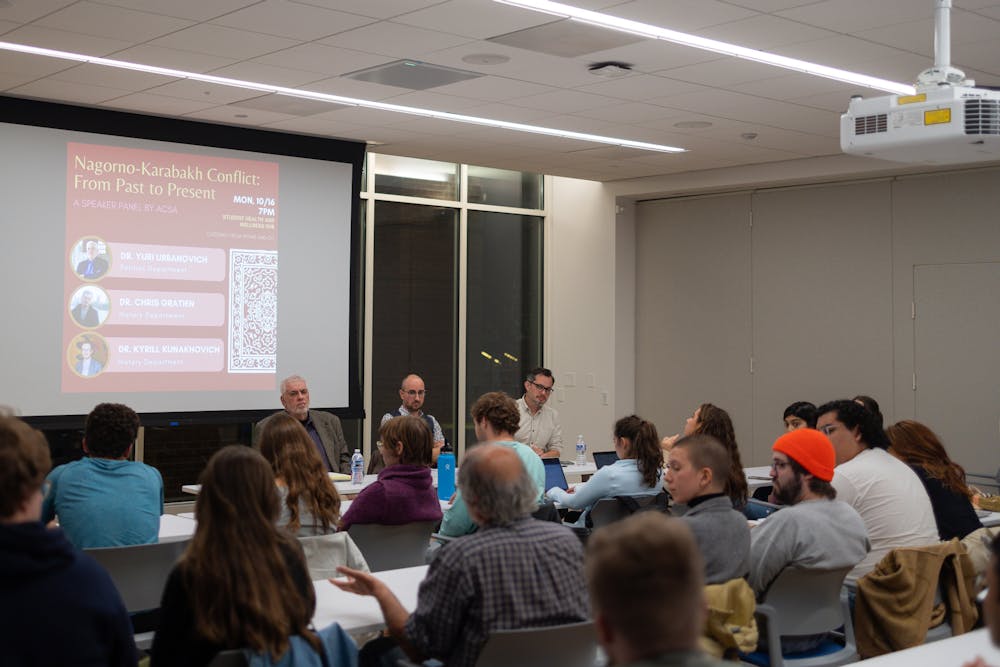The Armenian Cultural Student Association hosted a speaker panel Monday at 7 p.m. to discuss the historical context of the century-long tensions between Armenia and Azerbaijan, following Azerbaijan’s recent reclaim of the breakaway Nagorno-Karabakh region. The panel included Politics lecturer Dr. Yuri Urbanovich, History Prof. Chris Gratien and History Prof. Kyrill Kunakhovich.
Susanna Kharatyan, ACSA president and third-year College student, said the panel event was organized because of the importance for the University community to talk about the Nagorno-Karabakh situation, considering how underrepresented the conflict is at the University.
“It is a very controversial topic, but I think it's important for us to create a space where we could get professors to talk about the topic and raise awareness,” Kharatyan said.
Azerbaijan’s military captured the Nagorno-Karabakh region Sept. 19, which for the last several decades was under the control of a separatist, de facto government. Since then, over 100,000 Armenians have been displaced from the region.
Dozens of students showed up to the event, hosted in the Student Health and Wellness Building, to listen to the panelists present on the conflict’s historical context from the perspective of their various academic disciplines and specialties. The presentations were followed by audience questions at the end.
Gratien, whose specialty is migration and the Middle East, focused on the displacement of Armenians, emphasizing the cultural significance and symbolism of the Nagorno-Karabakh region.
“100,000 people leaving what they consider ancestral lands, leaving villages that have been there for a very long time, is a very big deal in world historical terms,” Gratien said. “It means losing everything.”
Gratien also said the current displacement is particularly traumatic because it is not the first time Armenians have been displaced on mass scale, referring to the Armenian Genocide in 1915 where nearly 1.2 million Armenians died in a conflict with the Ottoman Empire.
Urbanovich then provided the historical context of the regional dispute in the context of relations with Russia. Urbanovich said, in his opinion, it is doubtful to expect military intervention in the region from Russian forces or Western forces.
Kunakhovich also discussed the geo-political background of the dispute and explained how control of the territory has changed over the last two centuries. After the collapse of the Russian Empire in 1917, the Soviet Union controlled the Nagorno-Karabakh region for most of the 20th century, until the dissolution of the Soviet Union in 1991 when the area became contested again between Armenia and Azerbaijan.
“We see the ethnic cleansing and un-mixing of populations that has been a consistent trap throughout the century,” Kunakhovich said.
One audience member asked if the panel believed that there would be more presence from the United States in the conflict if Turkey was not a member of NATO, referencing Turkey’s support of the Azerbaijan military in the recent attack. Kunakhovich said he did not, considering how difficult it is to maintain American public support in more strategic zones.
“It seems very hard for me to imagine the U.S. wanting to exercise much direct presence,” Kunakhovich said.
Kharatyan said though the current situation is a deeply emotional and personal issue for many Amenians, she hopes they can work towards a more harmonious future through communication.
“We hope to humanize rather than politicize,” Kharatyan said. “We firmly believe that advocating for peace and the wellbeing of innocent civilians transcends any political boundaries or ideologies.”







